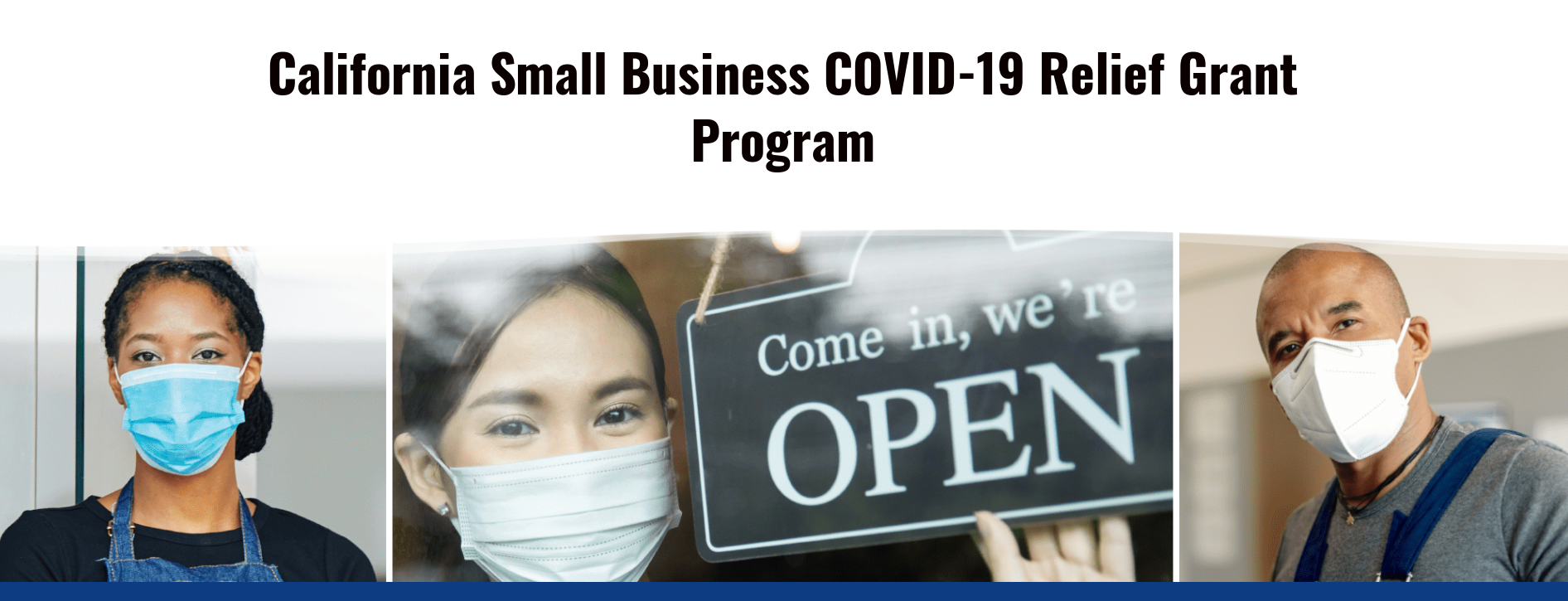|
Applications for the California Small Business COVID-19 Relief Grant Program OPEN on DECEMBER 30th. Here is information you need to know: For updated information visit: https://careliefgrant.com/ APPLICATION ROUNDS/DEADLINES ROUND 1
ROUND 2
INFORMATION NEEDED AT THE TIME OF APPLICATION Get your documentation in order to be prepared to apply when the application window opens. Necessary documents : 1. Application Certification: Signed certification used to certify your business 2. Business Financial Information: a. Most recent tax return filed (2019 or 2018) – provided in an electronic form for online upload, such as PDF/JPEG or other approved upload format. b. Copy of official filing with the California Secretary of State, if applicable, or local municipality for the business such as one of the following: Articles of Incorporation, Certificate of Organization, Fictitious Name of Registration or Government-Issued Business License. 3. Government Issued Photo ID: Such as a Driver’s License or Passport One complete application will qualify you to be considered for both rounds, please only apply once. Applying through multiple organizations will delay your application from being processed. Owners of multiple businesses, franchises, locations, etc. will be considered for only one grant and are required to apply for the business with the highest revenue. GRANT AMOUNTS The amount of grant funding ranges from $5,000 to $25,000. Businesses are eligible based on their annual revenue as documented in their most recent tax return: Eligible Businesses Annual Revenue / Grant Amount Available Per Business $1,000 to $100,000 / $5,000 Greater than $100,000 up to $1,000,000 / $15,000 Greater than $1,000,000 up to $2,500,000 / $25,000 ELIGIBILITY A small business or small nonprofit must satisfy the following criteria to be eligible to receive a grant award: 1. Must meet the definition of an “eligible small business”. An “eligible small business” means (i) a “small business” (sole proprietor, independent contractor, 1099 work, and or registered “for-profit” business entity (e.g., C-corporation, S-corporation, limited liability company, partnership) that has yearly gross revenue of $2.5 million or less (but at least $1,000 in yearly gross revenue) based on most recently filed tax return) or (ii) a “small nonprofit” (registered 501(c)(3) or 501(c)(6) nonprofit entity having yearly gross revenue of $2.5 million or less (but at least $1,000 in yearly gross revenue) based on most recently filed Form 990) 2. Active businesses or nonprofits operating since at least June 1, 2019 3. Businesses must currently be operating or have a clear plan to re-open once the State of California permits re-opening of the business 4. Business must be impacted by COVID-19 and the health and safety restrictions such as business interruptions or business closures incurred as a result of the COVID-19 pandemic 5. Business must be able to provide organizing documents including 2018 or 2019 tax returns or Form 990s, copy of official filing with the California Secretary of State, if applicable, or local municipality for the business such as one of the following: Articles of Incorporation, Certificate of Organization, Fictitious Name of Registration or Government-Issued Business License 6. Business must be able to provide acceptable form of government-issued photo ID 7. Applicants with multiple business entities, franchises, locations, etc. are not eligible for multiple grants and are only allowed to apply once using their eligible small business with the highest revenue HOW WILL GRANTS BE DETERMINED? First, applications will be reviewed to determine whether the applicant meets the eligibility requirements. Eligible businesses will then be scored based on COVID-19 impact factors incorporated into the Program’s priority criteria so that distribution can take into account priority key factors, including the following: 1. Geographic distribution based on COVID-19 health and safety restrictions following California’s Blueprint for a Safer Economy and county status and the new Regional Stay At Home Order; 2. Industry sectors most impacted by the pandemic; and 3. Underserved small business groups served by the State supported network of small business centers (i.e., businesses majority owned and run on a daily basis by women, minorities/persons of color, veterans and businesses located in low-to-moderate income and rural communities). INELIGIBLE BUSINESSES 1. Businesses without a physical location in California 2. Nonprofit businesses not registered as either a 501(c)(3) or 501(c)(6) 3. Government entities (other than Native American tribes) or elected official offices 4. Businesses primarily engaged in political or lobbying activities (regardless of whether such entities qualify as a 501(c)(3) or 501(c)(6)) 5. Passive businesses, investment companies and investors who file a Schedule E on their personal tax returns 6. Churches and other religious institutions (regardless of whether such entities qualify as a 501(c)(3) or 501(c)(6)) 7. Financial businesses primarily engaged in the business of lending, such as banks, finance companies and factoring companies 8. Businesses engaged in any activity that is illegal under federal, state or local law 9. Businesses of a prurient sexual nature, including businesses which present live performances of a prurient sexual nature and businesses which derive directly or indirectly more than de minimis gross revenue through the sale of products or services, or the presentation of any depictions or displays, of a prurient sexual nature 10. Businesses engaged in any socially undesirable activity or activity that may be considered predatory in nature such as rent-to-own businesses and check cashing businesses 11. Businesses that restrict patronage for any reason other than capacity 12. Speculative businesses 13. Businesses of which any owner of greater than 10% of the equity interest in it (i) has within the prior three-years been convicted of or had a civil judgment rendered against such owner, or has had commenced any form of parole or probation (including probation before judgment), for commission of fraud or a criminal offense in connection with obtaining, attempting to obtain, or performing a public (federal, state or local) transaction or contract under a public transaction; violation of federal or state anti-trust or procurement statutes or commission of embezzlement, theft, forgery, bribery, falsification or destruction of records, making false statements, or receiving stolen property, or (ii) is presently indicted for or otherwise criminally or civilly charged by a government entity, (federal, state or local) with commission of any of the offenses enumerated in subparagraph (i) above 14. “Affiliated” companies (as such term is defined in 13 C.F.R. § 121.103) 15. Multiple business entities, franchises, locations, etc. are not eligible for multiple grants and are only allowed to apply once using their eligible small business with the highest revenue
8 Comments
4/14/2023 08:32:47 am
Such an awesome post. This is really cool!
Reply
2/28/2024 12:49:17 pm
Good info on Business grants
Reply
4/29/2024 07:15:41 am
You've articulated your thoughts well, I'm nodding along.
Reply
4/29/2024 02:11:03 pm
I found myself agreeing with your points as I read through. They're right on target!
Reply
4/30/2024 10:07:32 pm
Your comment made me see things from a new angle. Thanks for sharing!
Reply
5/2/2024 03:27:35 am
Wonderful read! Thrilled to have stumbled upon. Explore our website for a reliable plumbing contractor in Ogden.
Reply
5/2/2024 09:35:20 am
Amazing! Keep spreading those good vibes! Need water heater repair in Salt Lake City? We've got you covered!
Reply
Leave a Reply. |
AuthorWrite something about yourself. No need to be fancy, just an overview. Archives
March 2021
Categories |


 RSS Feed
RSS Feed